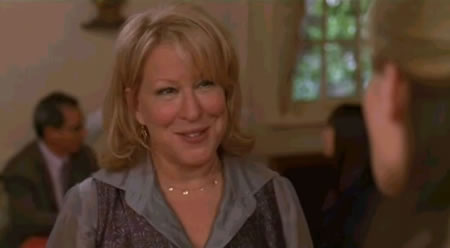The View Newspaper
Lipman’s take on the ties that bind
Karen Arnold
April 13, 2007
Elinor Lipman’s “Then She Found Me” had me from word one.
Okay, I admit it, a friend told me it was coming out as a movie with Bette Midler and Helen Hunt playing starring roles and I was hooked before I started reading. But the story gathered me into its wacky world quickly enough.
Think characters brassy, sassy, sexy, manipulative and looking-for-love, celebrity (the Bette Midler role, right?) and self-assured, tailored, quiet, fluent in Latin and teaching in a high school (the Helen Hunt role) and you have the polar opposites that generate tension in a plot that parades as a melodrama, but manages to make sharper points about mother-daughter relationships, ethnic stereotypes, public opinion and the morality of parading your private life in public.
You can try and write this off as chick-lit, but in the end that doesn’t work.
Page one begins with April explaining how adopted meant something extraordinary and wonderful in her life. Her parents made sure she understood they cherished her. Still, her fear was that her birth mother might appear. “”¦I slept with a light on in my bedroom until I was twelve, afraid she’d exercise her right” (page 1). There’s no hand-wringing anxiety here, but you feel the depth of April’s dread without any special effects.
When Bernice Graverman comes on the scene, finessed by a vaguely insulting visit to April by Bernice’s friend, Sonia, we are prepared for an entrance. But Bernice waits somewhere do
wn a “diner’s central aisle” (page 13). April tells us “I hated her within minutes” (page 13). What follows that initial understanding fits more what we expect from the friend’s patronizing and insinuating early questions.
Bernice proves to be self-centered and full of tales about April’s parentage that can barely be believed. She assumes April must have agonized knowing there was a mother “out there searching for you” (page 15). April’s common sense reply that, “she had no reason to think (her mother) was either out there or searching” (page 15) momentarily takes the wind out of Bernice’s sails — but only long enough for Sonia to start an exchange with Bernice that April views as just another performance.
In fact, it is page 116 before Bernice stops posturing and trying to force April’s emotional response to her. You feel, from this point on that their relationship may achieve a balance. You also know by then that April is becoming interested in Dwight Willamee, the geeky librarian at her high school.
Incidental to the main fireworks between April and Bernice, a history of April’s adoptive parents, the Epners, takes shape. Both survivors of the Nazi death camps, they adopt April and provide a secure — if conservative and slightly repressed — emotional home for her.
Vis-a-vis the Epners, Lipman comments on the social phenomenon of Holocaust survivors in America. In an exchange with her husband, Julius, Trude Epner thinks about her youthful vanity in Vienna and has a silent wish. But the war changed everything. She and Julius came to inhabit a world as survivors that cut them off forever from ordinary consideration in society.
They were marked forever and not just with their tattoos. Lipman’s handling of the Epners’ serious approach to their identities in this brief early chapter stays with readers to the novel’s final pages.
The serious issues of adoption, celebrity life, Holocaust survivors and finding love coincide with instances of Bernice appearing in leopard print clothing and making wildly inappropriate comments to Dwight or people on her show or in her life.
Every daughter who has wished her mother could be silenced or “winked away” when she starts to embarrass her, every woman looking back and wondering about the wisdom of earlier life choices, and every person who ponders how we can find real intimacy and understanding can find a chapter of commiseration or hilarity to highlight their situations in this novel.
It’s funny, but the kind of funny that occurs to you later over a cup of tea or reminds you that we all grapple endlessly with human foibles and desires.
We long for balance and a sense of belonging and Lipman’s characters touch us. In their pursuits we see ourselves.






